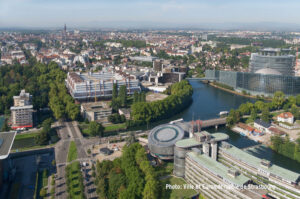In November 2016, Germany notified to the Commission plans to grant premiums to four highly efficient cogeneration plants. These individual measures are granted under Germany’s 2016 Combined Heat and Generation Act (CHP Act), which the Commission approved under EU state aid rules in October 2016. Individual measures under this Act need to be notified to the Commission for state aid scrutiny when they exceed the capacity threshold of 300 Megawatt set in the Commission’s 2014 Guidelines on state aid for environmental protection and energy.
Germany plans to support two existing CHP installations in the Berlin and Munich district heating areas. They are entitled to a premium of €1.5 cent/Kilowatt hour (KWh) during maximum 16 000 operating hours (so-called “full load hours”, working at maximum capacity). The other two beneficiaries are new installations in the Düsseldorf and Cologne district heating areas, entitled to a premium of €3.4 cent/KWh (higher premium reflects investment costs) during maximum 30 000 full load hours.
In line with the Guidelines, the support takes the form of a premium on top of the market price of cogenerated electricity fed into the public grid, and is limited in time. The Commission found the market premiums allow the plants to operate at times where they would not have been sufficiently profitable without the premium, thereby increasing their operating hours and the benefit in terms of CO2 emission savings and primary energy savings.Moreover, granting a market premium instead of fixed feed-in tariffs promotes the plants’ integration into the energy market, ensures that they are not overcompensated and limits the distortion of competition triggered by the public financing. Since the plants only receive the fixed premium during limited operating hours, they have an incentive to operate when the market price is higher. In line with the Guidelines, the plants will not receive any support when electricity prices are negative, i.e. when supply exceeds demand.
On this basis, the Commission concluded that the measures will help to reduce the use of fossil fuels and CO2 emissions, in line with EU energy and climate goals, and will help Germany achieve its objective to increase the net electricity production from CHP installations to 120 Terawatt (TWh) hours/year by 2025.
Background
The existing plants receiving support under today’s decisions are Berlin Mitte and München GuD2. The Commission also approved support for the new Niehl 3 plant in Cologne and the Lausward F plant in Düsseldorf.
On 24 October 2016, the Commission approved the German 2016 CHP Act which aims at improving the efficiency of energy production in Germany by increasing the net electricity production from CHP installations to 110 TWh/year by 2020 and to 120 TWh/year by 2025, as compared to the current yearly production of 96 TWh. The support is paid as a premium on top of the market price by the network operator to which the installation is connected. Both new and existing, depreciated installations are entitled to the premium under certain conditions.
The non-confidential version of the decision will be published in the State Aid Register on the competition website once any confidentiality issues have been resolved. It will be available under case numbers SA.46003, SA.46004, SA.45826, SA.45827.


 The European Commission has approved German plans to support four highly efficient cogeneration plants feeding Berlin, Cologne, Düsseldorf and Munich’s district heating networks. The Commission concluded the measures would further EU energy and climate goals whilst maintaining competition.
The European Commission has approved German plans to support four highly efficient cogeneration plants feeding Berlin, Cologne, Düsseldorf and Munich’s district heating networks. The Commission concluded the measures would further EU energy and climate goals whilst maintaining competition.
